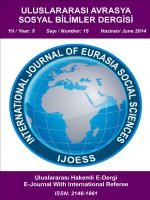COMPARISION OF KOREAN ESL LEARNERS’ WITH NATIVE SPEAKERS’ APOLOGIES: IMPLICATIONS FOR TEACHERS
Bir dili öğrenenler için kişinin o dildeki kullanım edinci yetkinliği, o dili anadili olarak konuşan kişilerle uygun şekilde iletişim kurmasında önemlidir. Kullanım edinci yetkinliğinin edinilmesi dili öğrenenler açısından uzun zaman alan bir süreçtir. Bu sürece yönelik olarak bu çalışma Koreli İngilizce öğrenen öğrencilerin özür dileme durumları ve özür üretim stratejilerini Amerikalı öğrencilerinkiyle karşılaştırmaktadır. Veriler 22 Koreli ve 54 Amerikalı öğrencilerin Yazılı Söylem Tamamlama Testi kullanılarak toplanmıştır. Veriler, Sözeylemlerden Özürlerin Sınıflandırılması temel alınarak, yaş, cinsiyet, İngilizce yeterlilik seviyesi ve kültürel değişkenler açısından nicel ve nitel olarak incelenmiştir. Bulgular, Koreli İngilizce öğrenen öğrencilerin özür formlarının İngilizceyi anadili olarak konuşanların kullandıkları formlara yakınlıklığı, Korelilerin Amerika’da ve İngilizce öğrenmek için geçirdikleri süre ile ilintili olduğunu göstermektedir. Özürlerde kullanılan pekiştiriciler cinsiyet, ki bayanlar erkeklere oranla daha çok, kültürel ve İngilizce yeterlilik seviyesi, ki Amerikalı öğrenciler Korelilere göre daha çok özür dileme eğiliminde, değişkenleri açısından farklılık göstermektedir. Bulguların İngiliz dili eğitimi açısından çıkarımları makale boyunca açıklanmaktadır.
Anahtar Kelimeler:
sözeylemler, İngiliz Dili eğitimi, özürler, kullanım edinci
COMPARISION OF KOREAN ESL LEARNERS’ WITH NATIVE SPEAKERS’ APOLOGIES: IMPLICATIONS FOR TEACHERS
For language learners, pragmatic competence is important to communicate appropriately with native speakers. Acquiring pragmatic competence takes longer time for language learners. In that sense, this present study compares Korean ESL learners’ apologies to native speakers of English. Data collected through Written Discourse Completion Tests applied to 22 Korean ESL learners and 54 American students. The data was coded based on the speech act sets for apologies. Then the data analyzed both quantitatively and qualitatively focusing on age, gender, English language proficiency level and cultural variables. The findings indicate that for Korean language learners time spent in the US and English language learning are significant in terms of using apologies more in line with native behavior. Use of intensifiers changes according to gender-females tend to use more- and cultural background and language proficiency level-Americans tend to use more compared to Koreans. Implications for ELT have been discussed throughout the paper.
Keywords:
speech acts, ELT, apologies, pragmatics,
___
- Baleghizadeh, S. (2007). “Speech Acts in English Language Teaching” Iranian Journal of Language Studies, 1-2, (143-154).
- Blum-Kulka, S.& Olshtain,E.(1984). “Request and Apologies. A Cross-cultural Study of Speech Act Realization Patterns (CCSARP)” Applied Linguistics 5,(196-212).
- Cohen, A.D. & Olshtain, E. (1981). “Developing a Measure of Sociocultural Competence: The Case of Apology” Language Learning, 31, (113-134).
- Cohen, A.D.& Olstain, E. (1985). Comparing apologies across languages, (175-184), (Ed. K.R. Jankowsky), Scientific and Humanistic Dimensions of Language, Amsterdam, Netherlands: John Benjamins.
- Cohen, A.D., Olshtain, E., & Rosenstein, D.S. (1986). “Advanced EFL Apologies: What Remains to be Learned?” Interlanguage Journal of the Sociology of Language, 62, (51-74).
- Cohen, A.D. & Olshtain, E. (1993). “The Production of Speech-acts by ESL Learners” TESOL Quarterly, 27, (33-56).
- Cohen, A.D.(1996). “Developing Ability to Perform Speech-acts” Studies in Second Language Acquisition, 18, (253-267).
- Cohen, A.D. (1996b). Speech-acts in Second Language Learning Contexts, (383-420), (Editors: S. MacKay & N.H. Hornberger), Sociolinguistics and Language Teaching, Cambridge: Cambridge University Press.
- Edmundson, R. J. (1992), Evidence for Native Speaker Notions of Apologizing and Accepting Apologies in American English, Unpublished doctoral dissertation, Indiana University, Bloomington, IN.
- Ferrara, K. (1994), Pragmatic Transfer in American’s Use of Japanese Thanking Routines, Unpublished manuscript, Department of English, Texas A&M University, College Station, TX.
- Frescura, M. A. (1993). A Sociolinguistic Comparison of "Reactions to complaints": Italian L1 vs. English L1, Italian L2, and Italian as a Community Language, Unpublished doctoral dissertation, Graduate Department of Education, University of Toronto, Toronto.
- Goffman, E. (1972). Encounters: Two Studies in the Sociology of Interaction. London: Allen Lane The Penguin Press.
- Holmes, J. (1989). “Women’s and Men’s Apologies: Reflectors of Cultural Values” Applied Linguistics, 10-2, (194-213).
- Kasper, G. (1992). “Pragmatic Transfer” Second Language Research, 8-3, (203-231).
- Kasper, G. (1997b). The Role of Pragmatics in Language Teacher Education, (113-136), (Editors: K. Bardovi Harlig & B. S. Hartford), Beyond Methods: Components of Language Teacher Education, NewYork: McGraw Hill.
- Linnell, J., Porter, F.L., Stone, H., Chen, W.(1992). “Can You Apologize Me? An Investigation of Speech Act Performance Among Non-native Speakers of English” Penn Working Papers in Educational Linguistics, 8-2, (33-53).
- Narita, S. & Young, R. (1994). “Apologies in English by Japanese learners” JALT Journal, 16-1, (75-89).
- Norrick, N. R. (1978). “Expressive illocutionary acts” Journal of Pragmatics, 2, (277-291).
- Olshtain, E. (1983). Sociocultural Competence and Language Transfer: The Case of Apology, (232-249), (Editors: S. Gass & L. Selinker), Language Transfer in Language Learning, Rowley, MA: Newbury House.
- Olstain, E.& Cohen, A.D.(1983). Apology: A Speech-act Set, (18-35), (Editors:N. Wolfson & E. Judd), Sociolinguistics and Language Acquisition, Rowley, MA: Newbury House.
- Olshtain, E. &Blum-Kulka, S. (1985). “Cross-cultural Pragmatics and the Testing of Communicative Competence” Language Testing, 2,(16-30).
- Olshtain ,E.(1989). Apologies Across Languages, (155-174), (Editors: S. Blum-Kulka, Juliane House & Gabriele Kasper), Cross-cultural Pragmatics: Requests and Apologies, Norwood, New Jersey: Ablex Publishing.
- Olshtain, E. & Cohen, A.D. (1989). Speech Act Behavior Across Languages, (53-68), (Editors: H. W. Dechert & Manfred Raupach), Transfer in Language Production, Norwood, New Jersey: Ablex Publishing.
- Rose, K. R. (2000). “An Exploratory Cross-sectional Study of Interlanguage Pragmatic Development” Studies in Second Language Acquisition, 22-1, (27-67).
- Tateyama, Y. (2001). Explicit and Implicit Teaching of Pragmatic Routines, (200-222), (Editors: K. R. Rose & G. Kasper), Pragmatics in Language Teaching, Cambridge, UK: Cambridge University Press.
- Trosborg, A. (1995). Interlanguage Pragmatics: Request, Complaints and Apologies. Berlin: Walter de Gruyter.
- Wu, Z. (1981), Speech act-apology, Report, Los Angeles: ESL Section, Department of English, UCLA.
- ISSN: 2146-1961
- Başlangıç: 2015
- Yayıncı: Kadir ULUSOY
Sayıdaki Diğer Makaleler
COMPARISION OF KOREAN ESL LEARNERS’ WITH NATIVE SPEAKERS’ APOLOGIES: IMPLICATIONS FOR TEACHERS
SINIF ÖĞRETMENLERİNİN “COĞRAFYA” İMAJLARI
Ayşegül ŞEYİHOĞLU, Yılmaz GEÇİT
İLKÖĞRETİM SOSYAL BİLGİLER 7. SINIF ÖĞRENCİLERİNİN GRAFİK OKUMA BECERİSİNİ KAZANMA DÜZEYLERİ
Şahin ORUÇ, İsmail Hakan AKGÜN
STRATEJİK PLANLAMA UYGULAMALARINA İLİŞKİN İLK VE ORTA ÖĞRETİM OKUL MÜDÜRLERİNİN GÖRÜŞLERİ
